With Muslims poised to spend over $480bn on clothes and footwear by 2019, the trend for high-end conservative fashion continues to grow
A train is sitting on a defunct railway track and music is pumping loudly as a predominantly female audience sits opposite a relic of what was once the Ottoman Empire’s busiest train hub.
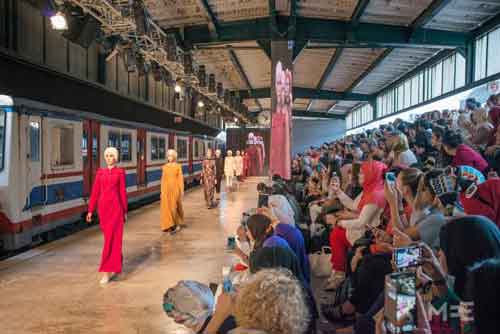
Models take to the runway for Turkish fashion designer Esin Ertan’s show finale (MEE/Emanuele Satolli)
Today, the Istanbul Haydarpasa train station, a spectacular example of neo-classical architecture, is an empty pseudo-castle that hosts events. Many hope its original function will one day resume, but for now it is Istanbul’s Modest Fashion Week, the first international fashion event aimed at setting a global trend in modest fashion for the conservative Muslim woman.
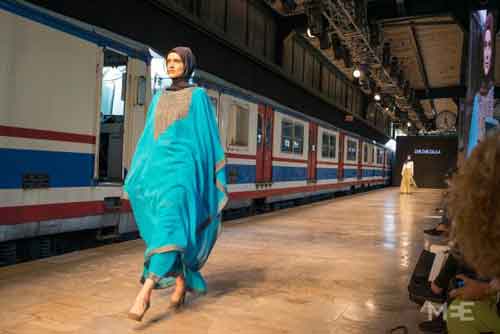
A model wearing a creation by Zamzam Zalila, a Germany based fashion designer label (MEE/Emanuele Satolli)
Most of the attendees are wearing colourful silk hijabs and are holding the latest smartphones, ready to record what is about to happen. When the lights come on, models from all over the world start walking the makeshift catwalk while dressed in modest outfits.
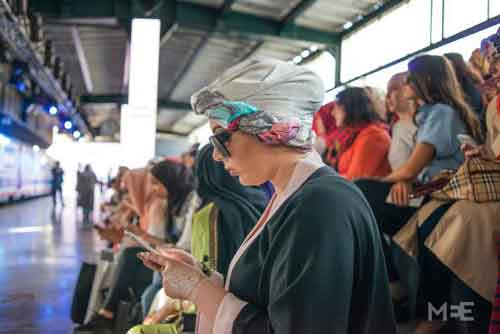
A woman checks her phone during the modest fashion show in Istanbul (MEE/Emanuele Satolli)
Sponsored by the Turkish modest fashion online retailer Modanisa, the show, which took place on 13 and 14 May, brought together approximately 100 fashion designers and brands from over 30 different countries to Istanbul.
“[This is] a true milestone for Turkey and global modest fashion, an industry that has been consistently ruled by national trends up to now,” proudly comments Ozlem Sahin, co-organiser of the event and formerly the promoter of the world’s first online hijab fashion show.
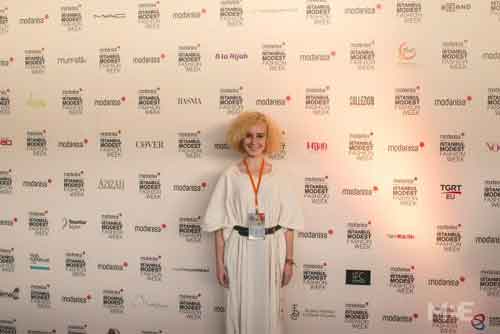
Ozlem Sahin, co-organizer of the first Istanbul Modest Fashion Week, the first fashion event catering to muslim women that brings together designers and audiences from all over the world (MEE/Emanuele Satolli)
According to a report by Thomson Reuters on the global Islamic economy, Muslims around the world spent $266bn on clothing and footwear in 2013. That figure is expected to increase to $484bn by 2019, surpassing the $350bn spent on clothes and shoes in 2012 by Americans – the largest consumerist society in the world.
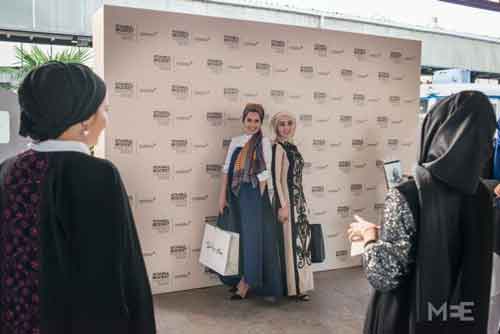
Models on the catwalk for German based designer Zamzam Zalila at the Istanbul Modest Fashion Week (MEE/Emanuele Satolli)
Former banker, and recently-turned fashion designer, Samar Murad from Bahrain is presenting her sophisticated Sufi-inspired collection. ‘We [Muslim women] often have to struggle to find flattering ready-to-wear outfits. It’s mostly a case of picking a piece here and there and mixing and matching them at home,” she says as she smiles looking at her floor-length black dress.
“My creations are made of several pieces, and if one wants to remove the under-garment from underneath a long, soft, silk dress, she’d be left in a low-necked cocktail dress. I thought of going the other way round.”
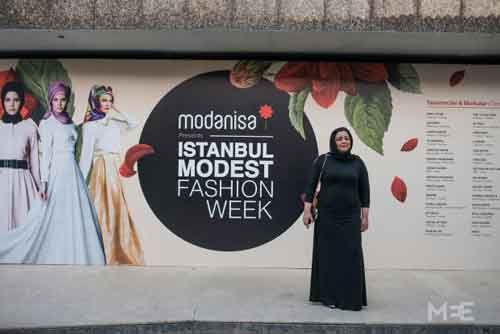
Samar Murad, a modest fashion designer from Bahrain who just launched her first collection at the Istanbul Modest Fashion Week. She was previously a successful banker (MEE/Emanuele Satolli)
Models from America, Russia, Europe, the Middle-East and South-East Asia are in the spotlight and they are sporting a variety of headwear ranging from creatively tied hijabs, to shawls culminating in a sort of satin baseball cap, or veils worn under straw hats. The combinations are endless and suit many different styles.
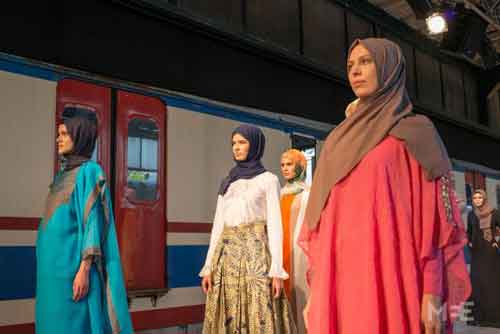
Models come out together once again at the end of Zamzam Zalila fashion show during the Istanbul Modest Fashion Week (MEE/Emanuele Satolli)
Original shoewear creations also make their debut. Colours range from black, to bright pink and yellow; some have carved heels which are narrow or wide, but most are generally very high and cause some models shaky ankles as they try to keep their balance on the runway.
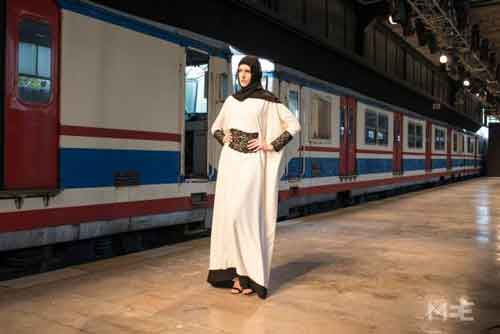
A model on the catwalk for German based designer Zamzam Zalila at the Istanbul Modest Fashion Week (MEE/Emanuele Satolli)
Twenty-four-year-old Brazilian model Vania from Sao Paolo has made Istanbul her home. She came to the city a year ago to pursue her career, but this is the first time she walks the catwalk in modest clothes. “It feels a bit weird, it’s definitely not what I grew up in,” she jokes.
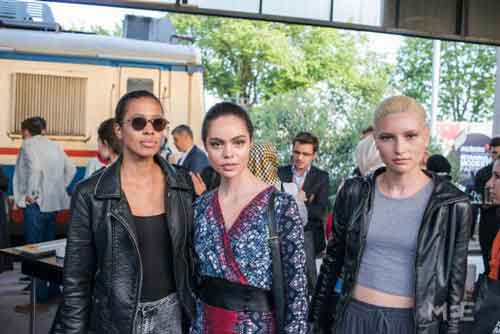
From the left Vania, Monique and Marina, three Brazilian models after a fashion show where they wore clothes for Muslim women at the Istanbul Modest Fashion Week (MEE/Emanuele Satolli)
Hilal Oguzkan, a Turkish fashion designer with three mono-brand retail shops in Istanbul, says her typical clients are women aged 15 to 60. “No matter their age, women generally like to have a second opinion when choosing their clothes in Turkey. Most of my clients come with female friends, just a few with their husbands,” she concludes.
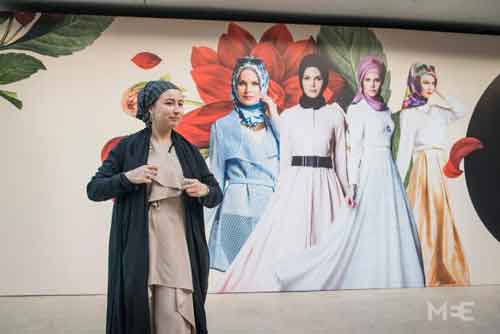
Hilal Oguzkan, a prominent Turkish modest fashion designer after a show at the Istanbul Modest Fashion Week (MEE/Emanuele Satolli)
Ainee Suhaidi came all the way from Kuala Lumpur to present her first modest collection. “It was a huge challenge for someone who doesn’t consider herself modest in the way she dresses to produce this collection,” she smiles as she wears a bright red, long dress. ‘While designing it, I kept asking myself if any woman could feel at ease in these clothes. For me, modest boils down to an elegant manner of covering what needs to be covered.”
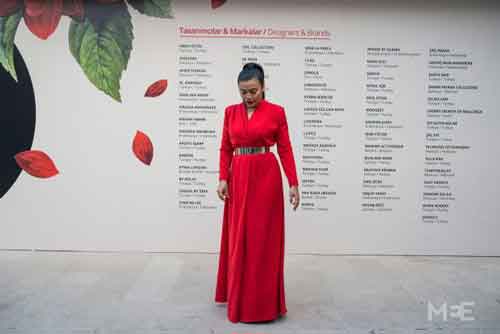
Ainee Suhaidi, a Malaysian fashion designer based in London after her show at the Istanbul Modest Fashion Week (MEE/Emanuele Satolli)
Esra Sezis Kigili was editor of the first modest fashion magazine in Turkey, Ala Dirgi. When it launched in 2011, she was the only employee wearing a hijab and jokes that she was “the one and only perfect candidate to become the public face of the magazine.” Since then her popularity has grown and she now boasts a career as a fashion consultant.
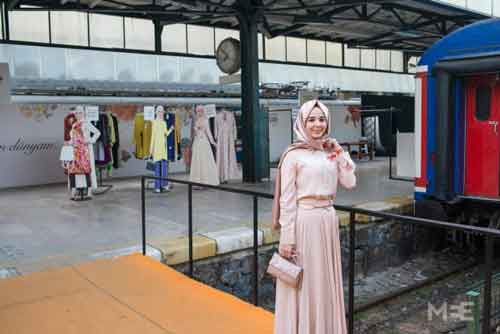
Esra Sezis Kigili, a very prominent Turkish modest fashion columnist and consultant, and the editor of the first Turkish modest fashion magazine, after a show at the Istanbul Modest Fashion Week (MEE/Emanuele Satolli)
Within six months, Ala Dirgi was selling very well. “We became a real point of reference, a ‘lighthouse’ for modest fashion brands and clients who never had a dedicated publication before. We truly gave conservative clothing a chance in this country, a space to express itself,” concludes Esra.
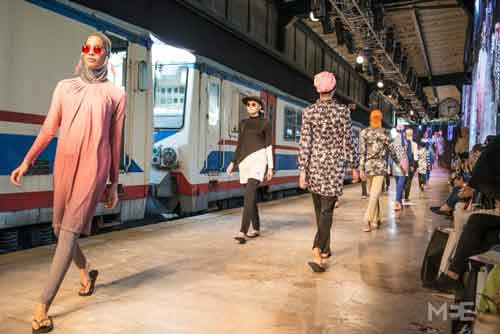
Models on the catwalk for Turkish designer Mayovera, one of the hundreds of modest fashion brands in the country (MEE/Emanuele Satolli)
Like many other Turkish women in the audience, she has no issues with a conservative fashion event taking place in a society that constitutionally defines public space as religiously neutral.
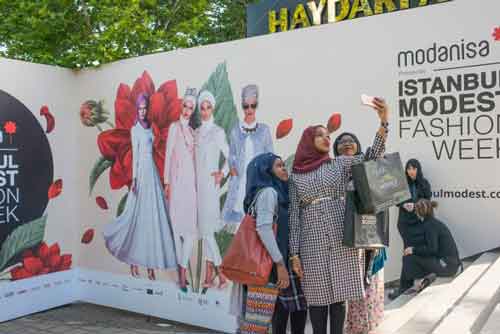
Young women taking a selfie at the entrance of Istanbul Modest Fashion Week, the first International fashion event showcasing collections for Muslim women from across the globe (MEE/Emanuele Satolli)
Source: www.middleeasteye.net



















